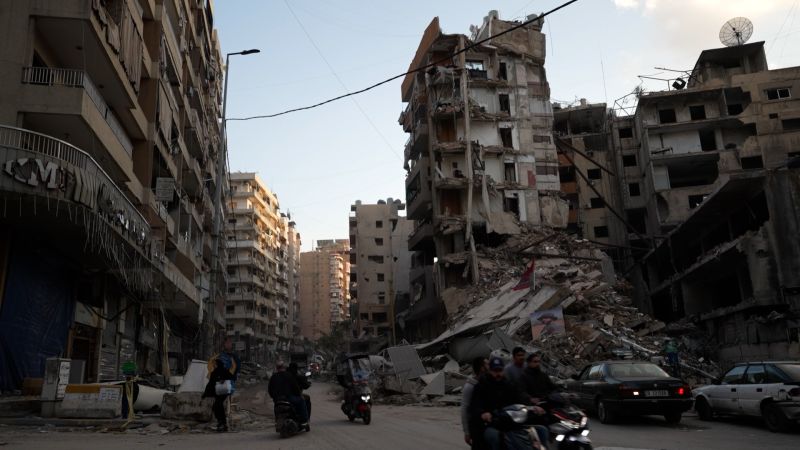For the first time since a ceasefire went into effect last week, Hezbollah has fired two projectiles toward Israeli-occupied territory, responding to repeated Israeli strikes since the agreement.
Israel has carried out daily strikes in Lebanon since Thursday, the day after a ceasefire went into effect. One person was killed in a strike in southern Lebanon, according to the Lebanese Ministry of Health.
Hezbollah had fired two projectiles, which landed in an open area on Monday, according to the Israeli military, which said no one was injured. The military did not specify the type of projectile fired.
Hours later, Israel’s military said it began striking “terror targets” in Lebanon after Israeli Prime Minister Benjamin Netanyahu vowed to retaliate in a statement, calling Hezbollah’s attack “a serious violation of the ceasefire.”
The Israel Defense Forces (IDF) said earlier on Monday that its own cross-border strikes, despite the ceasefire, had been “in response to several acts by Hezbollah in Lebanon that posed a threat to Israeli civilians, in violation of the understandings between Israel and Lebanon.” It said it had struck military vehicles at a Hezbollah missile manufacturing site in the Beqaa Valley and tunnels near the Syrian border in northern Lebanon.
Israeli Foreign Minister Gideon Sa’ar told his French counterpart in a phone call that his country is, in fact, enforcing the ceasefire – which stipulates Hezbollah’s withdrawal from the Israel-Lebanon border area – rather than violating it, Sa’ar said on X on Monday.
“The presence of Hezbollah operatives south of (Lebanon’s) Litani is a fundamental violation of the agreement and they must move north,” Sa’ar said, adding that Israel is “committed to the successful implementation of the ceasefire understandings.”
Hezbollah, in a statement, said that it targeted Israeli military positions “in light of the repeated violations initiated by the Israeli enemy of the ceasefire agreement.” Hezbollah accused Israel of breaking the ceasefire by “firing on civilians and airstrikes in different parts of Lebanon, resulting in the martyrdom of citizens and injuries to others, in addition to the continued violation of Lebanese airspace by hostile Israeli aircraft reaching the capital, Beirut.”
The IDF said the two Hezbollah projectiles were fired toward Shebaa Farms, known in Israel as Har Dov (Mount Dov), which under international law is considered occupied Syrian territory. Israel seized Shebaa Farms, along with the Golan Heights, from Syria after it was attacked in 1967. The U.S. recognized Israel’s sovereignty over the Golan Heights in 2019.
A shaky start
Both sides have, since the early hours of last week’s ceasefire, accused each other of violations, and the escalating tensions risk endangering the agreement altogether.
A senior Israeli official said Friday that the military intends to aggressively and unilaterally act against any ceasefire violations by Hezbollah.
US State Department spokesperson Matthew Miller said Monday that the ceasefire has not broken down. “Broadly speaking,” the ceasefire “has been successful,” he said.
“Obviously, when you have any ceasefire, you can see violations of it,” Miller acknowledged. He noted that the US and France had set up a mechanism “to look at all of these reports of violations of the ceasefire and deal with them through the channels that the mechanisms set up, and that’s what we’ll do over the coming days.”
The State Department official would not say whether the US had determined that any of the alleged violations were violations, saying that the work was ongoing. He also would not comment on reports that US envoy Amos Hochstein had raised violations in a letter to the Israeli government.
The ceasefire deal stipulates a 60-day cessation of hostilities, which negotiators have described as the foundation of a lasting truce. During that time, Hezbollah fighters are expected to retreat some 40 kilometers (25 miles) from the Israel-Lebanon border, while Israeli ground forces withdraw from Lebanese territory.
UN Security Council Resolution 1701, which ended the last all-out war between the two countries in 2006, has been the basis of the deal and the negotiations have mainly revolved around the treaty’s enforcement.
Under the agreement, Lebanon would implement a more rigorous supervision of Hezbollah’s movements south of the country’s Litani river, to prevent militants from regrouping there.
United Nations peacekeeping troops, the Lebanese military, and a multinational committee will be tasked with supervising the Iran-backed group’s movements.



























